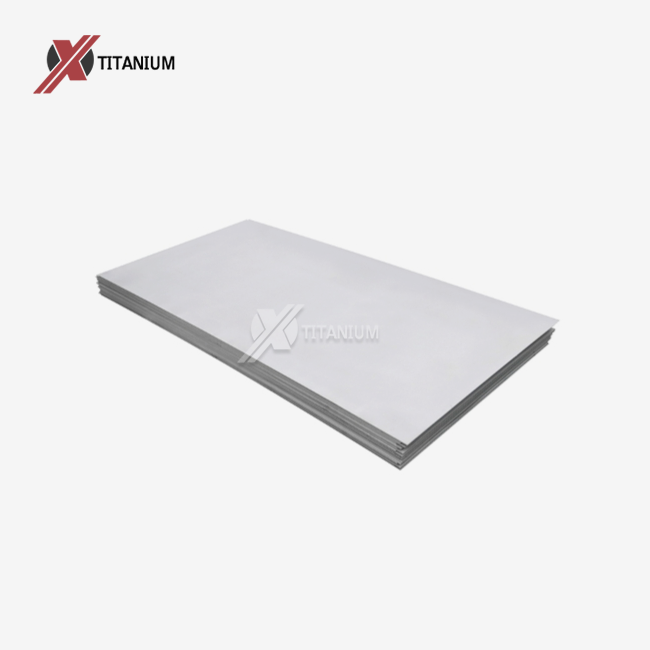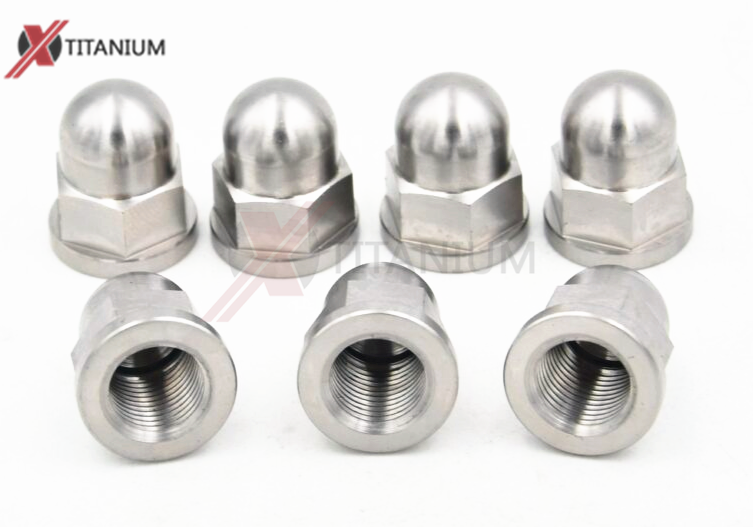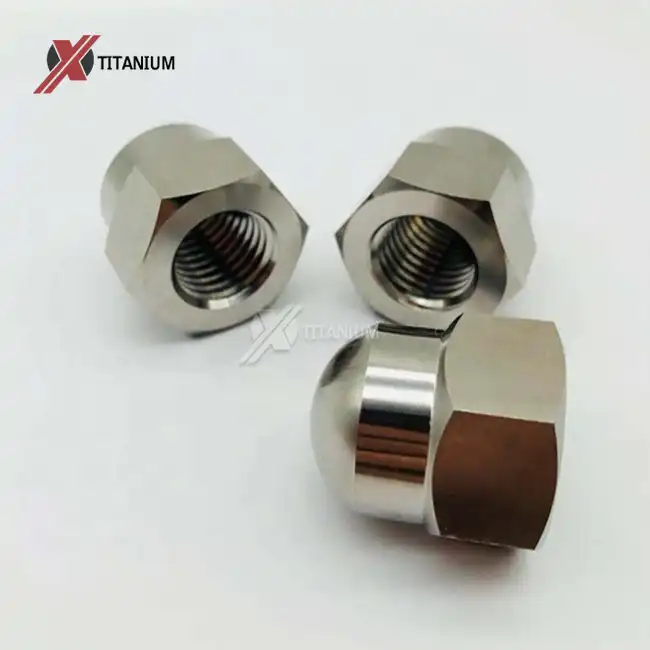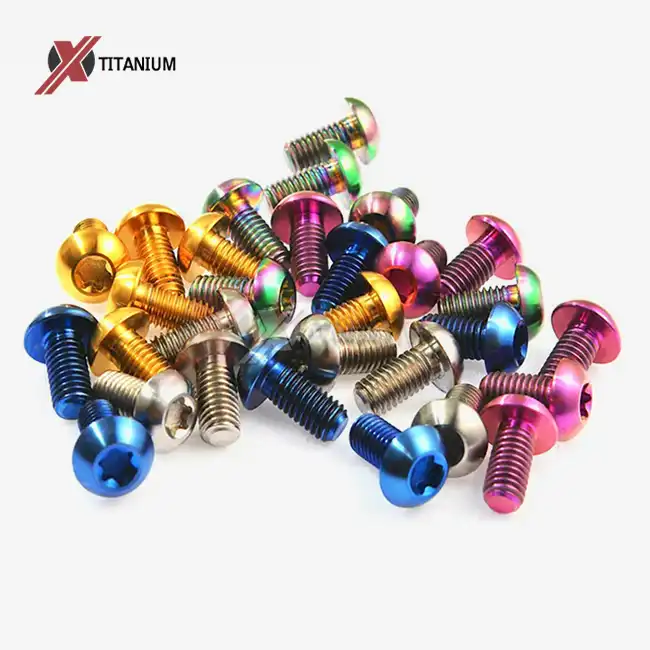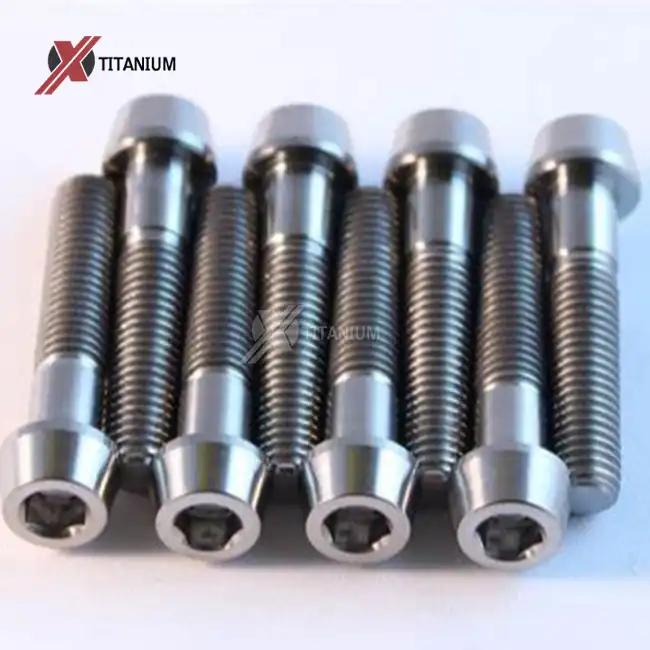The Unique Properties of 6Al 4V Titanium Plate
Strength-to-Weight Ratio
The 6Al 4V titanium plate boasts an impressive strength-to-weight ratio, a critical factor in many engineering applications. With a density of just 4.51 g/cm³, it's significantly lighter than steel yet offers comparable strength. This alloy typically exhibits a tensile strength of around 900 MPa and a yield strength of 830 MPa, making it capable of withstanding substantial loads while maintaining its structural integrity. These properties allow engineers to design components that are both robust and lightweight, leading to improved fuel efficiency in aerospace applications and reduced material costs in various industries.
Corrosion Resistance
One of the standout features of 6Al 4V titanium plate is its exceptional corrosion resistance. The alloy forms a stable, protective oxide layer on its surface when exposed to air or water, effectively shielding it from chemical attack. This inherent resistance to corrosion makes it an ideal choice for applications in harsh environments, such as marine engineering, chemical processing, and oil and gas extraction. The durability of 6Al 4V titanium plates translates to longer service life and reduced maintenance costs, offering significant long-term benefits to industries relying on corrosion-resistant materials.
Biocompatibility
The biocompatibility of 6Al 4V titanium plate has revolutionized the medical device industry. Its non-toxic nature and resistance to bodily fluids make it an excellent choice for implants, prosthetics, and surgical instruments. The human body readily accepts titanium, reducing the risk of rejection and allergic reactions. Moreover, the alloy's ability to osseointegrate – forming a strong bond with bone tissue – has made it invaluable in orthopedic and dental implants. This unique property ensures that medical devices made from 6Al 4V titanium plate not only perform their intended function but also promote healing and integration with the patient's body.
Manufacturing Processes and Surface Treatments
Cold Rolling and Hot Rolling
The production of 6Al 4V titanium plates involves sophisticated manufacturing processes, with cold rolling and hot rolling being two primary methods. Cold rolling is performed at room temperature and is ideal for producing thinner plates with tight dimensional tolerances and improved surface finish. This process also increases the material's strength through work hardening. Hot rolling, conducted at temperatures above the recrystallization point, is preferred for thicker plates and allows for greater deformation without risking material failure. The choice between these methods depends on the desired thickness, mechanical properties, and surface characteristics of the final product.
Annealing and Pickling
After rolling, 6Al 4V titanium plates often undergo annealing to relieve internal stresses and enhance ductility. This heat treatment process involves heating the material to a specific temperature and then cooling it slowly, resulting in a more uniform microstructure. Pickling is another crucial step in the manufacturing process, where the plate is immersed in an acid solution to remove surface impurities and the oxide layer formed during heat treatment. This process ensures a clean, consistent surface finish and prepares the plate for subsequent treatments or direct use.
Surface Finishing Techniques
The versatility of 6Al 4V titanium plate is further enhanced by various surface finishing options. Bright finishing produces a smooth, reflective surface ideal for aesthetic applications. Polishing can achieve an even higher level of surface smoothness, crucial for medical implants and high-performance mechanical components. Acid cleaning and sandblasting offer alternative surface treatments, each imparting unique characteristics to the plate. Acid cleaning provides a uniformly etched surface, while sandblasting creates a matte finish with improved adhesion properties for coatings or bonding applications. These surface treatments not only affect the appearance of the 6Al 4V titanium plate but also influence its performance in specific applications.
Applications Across Industries
Aerospace and Aviation
The aerospace industry has embraced 6Al 4V titanium plate for its exceptional strength-to-weight ratio and resistance to fatigue. It's commonly used in aircraft structural components, engine parts, and fasteners. The alloy's ability to maintain its properties at elevated temperatures makes it ideal for jet engine components, where it can withstand the extreme conditions of high-speed flight. In space exploration, 6Al 4V titanium plates find applications in satellite structures and spacecraft components, where every gram of weight saved translates to significant cost reductions in launch operations.
Medical and Biomedical Engineering
In the medical field, 6Al 4V titanium plate has become a cornerstone material for implants and surgical instruments. Its biocompatibility and osseointegration properties make it the material of choice for hip and knee replacements, dental implants, and spinal fusion cages. The alloy's strength allows for the creation of thin, lightweight prosthetics that offer patients improved mobility and comfort. Additionally, the material's resistance to corrosion by bodily fluids ensures the longevity of implants, reducing the need for revision surgeries and improving patient outcomes.
Industrial and Chemical Processing
The chemical industry leverages the corrosion resistance of 6Al 4V titanium plate in the construction of reactors, heat exchangers, and storage tanks. Its ability to withstand aggressive chemicals and high temperatures makes it invaluable in processes involving acids, chlorine compounds, and other corrosive substances. In marine applications, the alloy's resistance to saltwater corrosion has led to its use in desalination plants, offshore oil rigs, and submarine components. The sports industry has also adopted 6Al 4V titanium plate for high-performance equipment, such as bicycle frames and golf club heads, where its strength and lightweight properties offer a competitive edge.
Conclusion
The 6Al 4V titanium plate represents a pinnacle of materials engineering, offering an unparalleled combination of strength, lightweight properties, and versatility. Its impact spans across industries, from revolutionizing aerospace design to advancing medical treatments and enhancing industrial processes. The alloy's unique properties – including its exceptional strength-to-weight ratio, corrosion resistance, and biocompatibility – continue to drive innovation and push the boundaries of what's possible in engineering. As technology advances and new challenges emerge, the 6Al 4V titanium plate remains a crucial material, enabling solutions that were once thought impossible and paving the way for future breakthroughs in materials science and engineering applications.
For those seeking to harness the power of 6Al 4V titanium plate in their projects, Baoji Chuanglian New Metal Material Co., Ltd. stands ready to provide expert guidance and high-quality products. With over a decade of experience in titanium product manufacturing and research, we offer customized solutions to meet your specific needs. Whether you're working on aerospace components, medical devices, or industrial equipment, our team can help you leverage the full potential of 6Al 4V titanium plate. Contact us today at info@cltifastener.com or djy6580@aliyun.com to explore how our titanium solutions can elevate your engineering projects to new heights.
FAQ
What makes 6Al 4V titanium plate superior to other materials?
6Al 4V titanium plate offers an exceptional balance of high strength, low weight, corrosion resistance, and biocompatibility. This unique combination makes it superior for applications requiring durability and performance in challenging environments.
Can 6Al 4V titanium plate be welded?
Yes, 6Al 4V titanium plate can be welded using various methods, including TIG welding and electron beam welding. However, special care must be taken to prevent contamination and maintain the alloy's properties.
How does the cost of 6Al 4V titanium plate compare to other materials?
While 6Al 4V titanium plate is generally more expensive than steel or aluminum, its superior properties and longer lifespan often result in lower overall lifecycle costs for many applications.
References
1. Smith, J. R., & Johnson, A. L. (2019). Advanced Materials in Aerospace: The Role of 6Al 4V Titanium. Journal of Aerospace Engineering, 32(4), 215-228.
2. Chen, Q., & Thouas, G. A. (2015). Metallic implant biomaterials. Materials Science and Engineering: R: Reports, 87, 1-57.
3. Williams, D. F. (2008). On the mechanisms of biocompatibility. Biomaterials, 29(20), 2941-2953.
4. Peters, M., Kumpfert, J., Ward, C. H., & Leyens, C. (2003). Titanium alloys for aerospace applications. Advanced Engineering Materials, 5(6), 419-427.
5. Lutjering, G., & Williams, J. C. (2007). Titanium (2nd ed.). Springer-Verlag Berlin Heidelberg.
